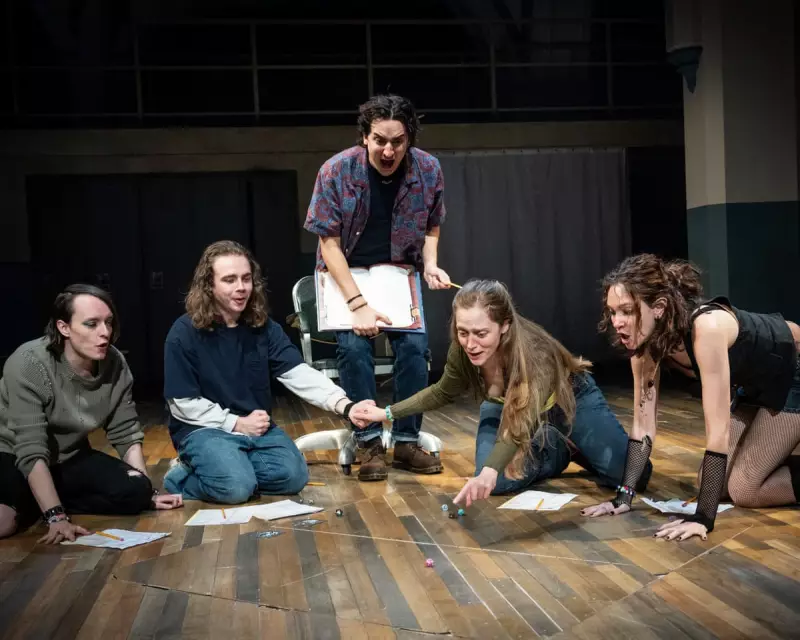
In an era of shortening attention spans, a remarkable five-hour theatrical production is challenging conventions and captivating audiences through the unexpected world of Dungeons & Dragons. Initiative, the new off-Broadway coming-of-age epic, proves that duration can enhance rather than hinder emotional engagement when the storytelling warrants it.
The Art of Audience Commitment
Playwright Else Went, who uses they/she pronouns, deliberately crafted the production's substantial length as an integral part of the experience. "When you sit in the theatre for long enough – without feeling like the thing that you're watching is failing you – there's a certain point that you cross as an audience member, where you enter a new type of commitment," Went explained. "And it is in that state that new things can happen, dramatically."
This ambitious approach appears to be paying dividends, with the four-and-a-half-hour play (including several intermissions) reportedly flying by for audiences, achieving an emotional immersion that mirrors the Dungeons & Dragons games central to its narrative.
Beyond Cultural Clichés
Initiative arrives during a resurgence of interest in Dungeons & Dragons, partially fueled by the Netflix phenomenon Stranger Things, which incorporates D&D players and terminology into its 1980s-set narrative. However, the play deliberately subverts expectations by setting its story in the early 2000s rather than the more commonly referenced '80s era.
The production follows seven teenage characters between 2000 and 2004, with the Dungeons & Dragons gameplay not beginning until late in the first of three 90-minute acts. Riley (Greg Cuellar) serves as Dungeon Master for his younger friends Em (Christopher Dylan White), Tony (Jamie Sanders), and Kendall (Andrea Lopez Alvarez). They're later joined by Riley's best friend Clara (Olivia Rose Barresi), who discovers the game provides an unexpected escape from academic pressures, romantic traumas, and post-9/11 anxieties.
"It was really important to me to think of the game as a nucleus of a community," Went noted regarding the delayed introduction of the D&D campaign. "The ways that people are changed by playing this game in this social group are because of Riley's authorship, not because Dungeons & Dragons exists."
Grounding Fantasy in Reality
Director Emma Rose Went, who is married to the playwright, emphasised the importance of establishing the characters as individuals first. "For this play, it makes so much narratively to understand the community first as individuals, where they're coming from," she explained.
This character-driven approach avoids the expositional shortcuts common in less expansive works. "I'm really tired of plays that use that shorthand," Else Went stated, "that do not invest in the humanity of their characters and rather use them as signifiers for some philosophical or sociopolitical argument."
The production is meticulously grounded in early 2000s culture, from post-9/11 anxieties to beautifully staged instant-messaging conversations that the creative team dubbed "chat ballets." These scenes, showing teenagers balancing multiple IMs simultaneously, will likely trigger powerful memories for anyone born between 1980 and 1990.
"I wanted to look at the early part of the internet and its effects on how we exist socially and interpersonally with each other, right before social media," Else explained. Emma further clarified their approach: "What we needed to do was not play the internet, but actually play teenagers in isolated spaces. You can't embody digital noise. But what you can embody is isolation."
Reimagining Nostalgia
While Initiative engages with nostalgia, it does so with a more complex understanding of the concept. "The original concept of nostalgia is one of pain – not one of comfort, necessarily," Else elaborated. "It's a painful desire for home or for past, or some sense of being able to be in a situation in which one cannot again be."
They added that the term originally described experiences of soldiers, explaining: "That's sort of where I tried to hit with it. Nostalgia is a thing that reminds us of things that we may not have appreciated at the time we experienced them, and there's a desire to appreciate them properly."
The Power of Imagination
The production's staging cleverly evolves throughout its duration. Earlier fantasy sequences feature characters bounding around the stage with props, costumes, and special lighting to represent their role-played adventures. However, a pivotal later game is staged without any theatrical embellishment – just players sitting on the floor, rolling dice, and scribbling calculations on character sheets.
Remarkably, this stripped-back approach proves just as compelling as the more elaborate sequences. "By the time we arrive at that last game, we're capable of doing that imagining with them," Else noted succinctly.
This inclusive quality makes Initiative accessible even to those unfamiliar with Dungeons & Dragons. Director Emma Rose Went, who doesn't consider herself an experienced D&D player, found parallels in her own teenage experiences: "The analog that I had as a teenager is making theatre. For me, a lot of what the game is doing [in the play] is functioning as a stand-in for what it feels like to make theatre with your community."
Initiative continues its run at New York's Public Theater until 7 December, demonstrating that in an age of digital distraction, profound theatrical experiences can still command – and reward – our extended attention.





